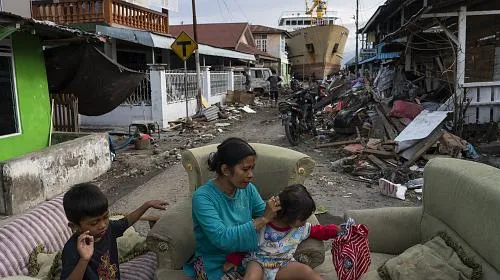JAKARTA (October 17, 2018)— CARE is distributing hygiene kits to around 1,000 households in some of the worst affected areas hit by the earthquake and tsunami on the Indonesian island of Sulawesi. Lack of clean water and access to sanitation facilities are two of the biggest problems currently facing survivors.
“People have lost everything, including their homes and they are dealing with the trauma of their experience,” said Wahyu Widayanto, CARE Indonesia’s Emergency Response Coordinator on the ground in Palu. “We are also starting to see instances of disease outbreak with fever and diarrhea reported. On top of this people are still living with the daily fear of continuing aftershocks and small quakes.”
CARE’s needs assessment showed that over 80 percent of people affected by the earthquake and tsunami are staying outside their homes, either because they have been damaged, or for fear of further quakes. Some 30 percent of those do not have access to clean, safe drinking water, with many drinking out of communal wells or rivers. CARE is providing buckets and water purification tablets to help address some of these needs.
CARE Indonesia is working in the worst affected areas of Palu, Donggala and Sigi in some of the most remote and hard to access communities.
CARE’s hygiene kits include items such as soap, water purification tablets, buckets and laundry detergent. They also include items specifically targeted at women and girls, such as sanitary napkins.
“Women in particular are telling me their big worries are things like milk for their babies, and that they are running out of sanitary products, which is a real worry considering they live in communal shelters, or even out in the open,” Widayanto said. “They are also very worried about being able to go back to their houses and rebuilding after all this destruction.”
CARE is looking to raise $15 million in funding to be used over a four-year period to provide this immediate life-saving assistance, as well as to be able to respond to longer term needs.
“Much of people’s land has been destroyed through mud ‘liquefication,” Widayanto notes. “This has an impact on both sources of food and potential incomes. Without a harvest, the effects are likely to be long-lasting. Going forward, we will also be looking at cash assistance programs to help people get back on their feet.”
About CARE:
Founded in 1945, CARE is a leading humanitarian organization fighting global poverty. CARE has more than seven decades of experience helping people prepare for disasters, providing lifesaving assistance when a crisis hits, and helping communities recover after the emergency has passed. CARE places special focus on women and children who are often disproportionately affected by disasters. Last year, CARE worked in 94 countries to reach 80 million people, including more than 11 million through emergency response and humanitarian aid.
To learn more, visit www.care.org
Media Contact:
Nicole Harris, 404-735-0871 nharris@care.org

